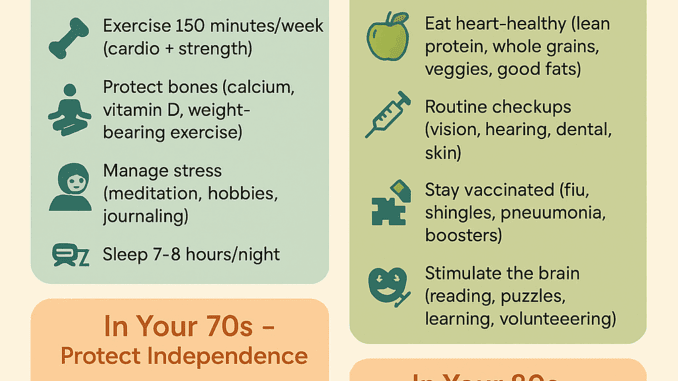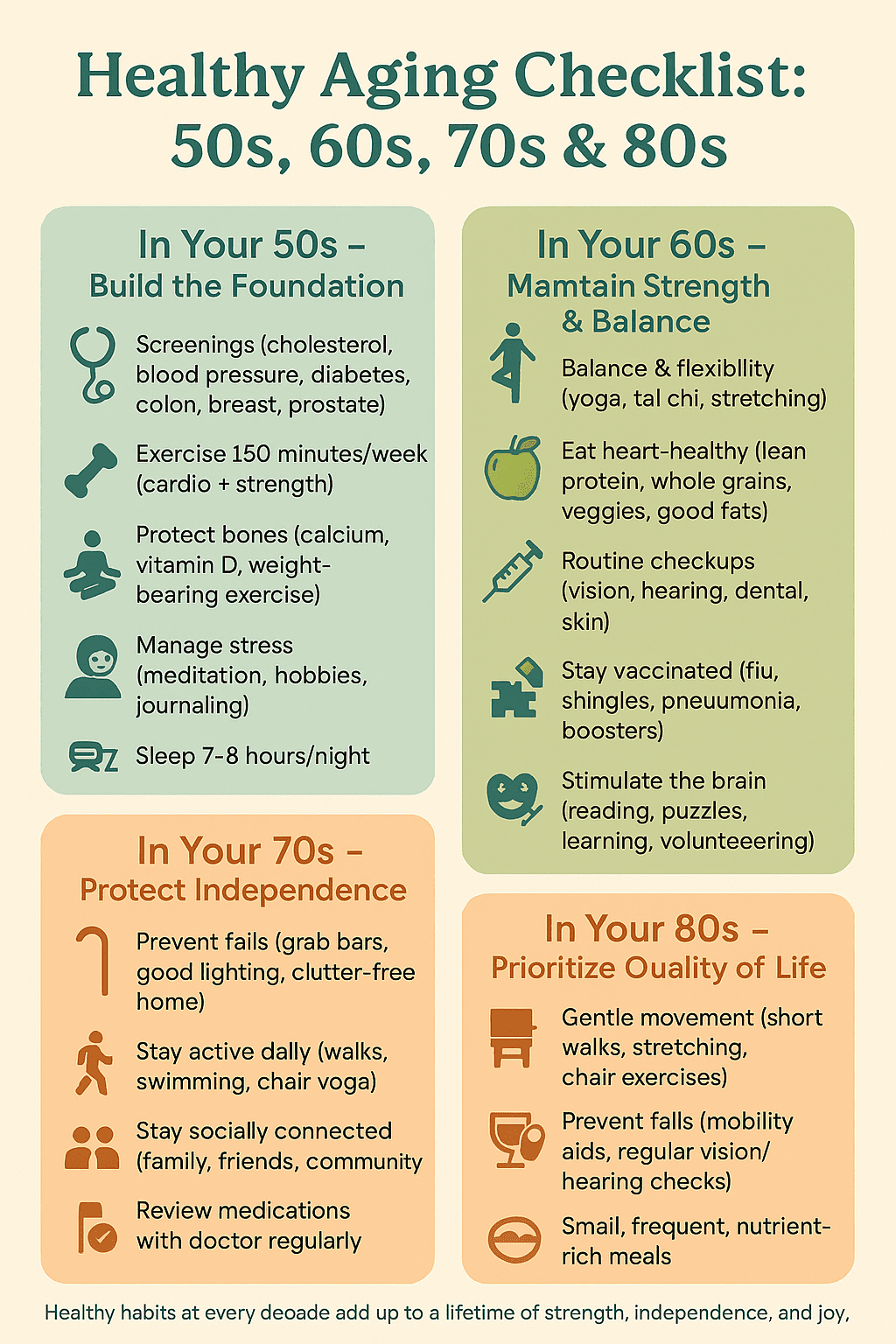
Aging gracefully isn’t just about genetics—it’s about making the right choices at every stage of life. While no two people age the same, each decade brings new opportunities and challenges for maintaining vitality. Here’s what seniors should prioritize healthwise in their 50s, 60s, 70s, and 80s to enjoy the fullest, healthiest life possible.
In Your 50s: Laying the Groundwork
The 50s are the “prevention decade.” What you do now sets the tone for the decades ahead.
-
Stay Active: Commit to at least 150 minutes of weekly exercise, including cardio and strength training.
-
Preventative Screenings: Get regular checkups for cholesterol, blood pressure, diabetes, and cancer (colon, breast, prostate).
-
Protect Bones: Add calcium, vitamin D, and weight-bearing exercises to prevent osteoporosis.
-
Manage Stress: Practice meditation, journaling, or hobbies to balance life’s pressures.
-
Prioritize Sleep: 7–8 hours a night supports memory, immunity, and emotional health.
Mindset for your 50s: Prevention is power. Build resilience now to stay strong later.
In Your 60s: Maintaining Strength and Balance
The 60s bring transitions—retirement, caregiving roles, or lifestyle changes—making stability and consistency crucial.
-
Balance and Flexibility: Yoga, tai chi, and stretching reduce fall risks.
-
Nutrition First: Eat lean proteins, whole grains, and heart-healthy fats while limiting processed foods.
-
Routine Checkups: Monitor hearing, vision, skin, and dental health regularly.
-
Stay Vaccinated: Flu, shingles, pneumonia, and booster shots protect against serious illness.
-
Cognitive Health: Stimulate your brain with reading, puzzles, learning, or volunteering.
Mindset for your 60s: Consistency counts. Maintain habits that protect both body and mind.
In Your 70s: Preserving Independence
By the 70s, the focus shifts to mobility, safety, and social connection.
-
Fall Prevention: Modify your home (grab bars, good lighting, clutter-free walkways).
-
Daily Movement: Light but regular activity like walking, swimming, or chair yoga supports independence.
-
Stay Connected: Social interaction combats loneliness and protects cognitive health.
-
Medication Management: Work with your doctor to simplify prescriptions and reduce risks.
-
Hydration & Nutrition: Appetite may shift, but hydration and protein are essential for energy.
-
Advance Planning: Discuss health wishes and update legal documents with family.
Mindset for your 70s: Protect independence. Prioritize safety, mobility, and connection.
In Your 80s: Focusing on Quality of Life
The 80s are about sustaining joy, dignity, and quality of life while adapting to new realities.
-
Gentle Movement: Even light activity—short walks, stretching, or chair exercises—helps maintain circulation and mobility.
-
Prevent Falls Relentlessly: Review home safety often, use mobility aids if needed, and keep vision/hearing checks up to date.
-
Nourish Wisely: Eat small, frequent, nutrient-rich meals to keep strength and immunity strong.
-
Stay Engaged: Prioritize purpose—whether through family, hobbies, faith, or community groups.
-
Monitor Medications: Reevaluate prescriptions to reduce side effects and simplify regimens.
-
Emotional Well-being: Joy, humor, and companionship are as important as physical health.
-
Care Partnerships: Collaborate with caregivers, doctors, and loved ones to preserve autonomy and dignity.
Mindset for your 80s: Quality over quantity. Focus on joy, comfort, and meaningful connections.
Final Word
From prevention in your 50s to quality of life in your 80s, healthy aging is about intentional choices, not perfection. Each decade builds on the last, and every step—no matter how small—adds up to a stronger, more fulfilling life.

